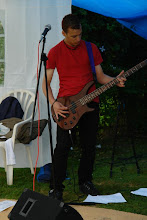In the matter of Legal, Regulatory/professional and financial constraints the biggest problems came from the actual evening itself. The main legal issue was the issue of getting permission to film a live audience. This would at first (as I planned to film the audience) have been time consuming and almost impossible as I would have to get each member of the audiences permission and a signed document to prove it. With over a hundred guests attending this was impractical. We instead opted to not film the audience at all and just put a notification on the entrance saying something along the lines of “This presentation features live recording equipment and will therefore guests may appear on film”.
During both the creation of the ad and the planning/execution of the evening the only professional constraints my team (post production) encountered was time. We had very little time to effectively plan the post production aspects of the evening and therefore had to be more efficient in the planning process. This also required us to be more creative.
Financially (in the case of the event) post production accrued zero cost due to editing being done in house.
In the case of the ad I developed a budget to accurately display financial information and to determine the cost to profit information. This proved to be a very helpful tool not only during the production of the ad but most of all in the advert pitch.
Perhaps the most important factor in the two projects mentioned is time management. Because we had such a small time scale to work in it was essential that we managed our time in the most essential way possible. This meant that group working was very important. To ensure that the project was continually moving forward we would have at least one meeting a week to discuss where we were with the project and to asses if what we had completed so far was what we felt was of a high enough standard.
Due to the scattered nature of the group it might have been a good idea to assign a leader to the post production side of the event. In a sense “Nina Mann” fulfilled this duty due to her technical knowledge of the editing systems.
As with all live events though problems arose and one of the main features I designed for the event (the DVD menu) had to be scrapped due to technical difficulties. We instead choose a much less complicated method for the Video presentations.
However the much of the graphics my team (graphics production) developed were used very effectively and gave the event a professional feel to them.
For future projects of a similar nature I think that a larger time scales would help to achieve a much more professional evening. However I believe that overall both the evening and the ad were a success and would just about be acceptable to a client requiring a professional project of a similar nature.
Thursday, 26 June 2008
Tuesday, 20 May 2008
Research into media events

Brit awards:
The BRIT Awards, often simply called The BRITs, are the British Phonographic Industry's annual pop music awards. The name was originally a shortened form of British or Britannia, but has subsequently become a "backronym" for British Record Industry Trust.
The BRIT Awards, often simply called The BRITs, are the British Phonographic Industry's annual pop music awards. The name was originally a shortened form of British or Britannia, but has subsequently become a "backronym" for British Record Industry Trust.
MOBO’s:

The MOBO Awards, established in 1996 by Kanya King and Andy Ruffell, are held annually in the UK to recognise artists of any race or nationality performing music of black origin.
BAFTA’s:
The BRIT Awards, often simply called The BRITs, are the British Phonographic Industry's annual pop music awards. The name was originally a shortened form of British or Britannia, but has subsequently become a "backronym" for British Record Industry Trust.
The BRIT Awards, often simply called The BRITs, are the British Phonographic Industry's annual pop music awards. The name was originally a shortened form of British or Britannia, but has subsequently become a "backronym" for British Record Industry Trust.
MOBO’s:

The MOBO Awards, established in 1996 by Kanya King and Andy Ruffell, are held annually in the UK to recognise artists of any race or nationality performing music of black origin.
BAFTA’s:

The British Academy of Film and Television Arts (BAFTA) is a British charity that hosts annual awards shows for film, television, television craft, video games and forms of animation. They are often cited as the British equivalent to the Oscars . BAFTA was founded in 1947 as The British Film Academy, by David Lean, Alexander Korda, Carol Reed, Charles Laughton, Roger Manvell and others. In 1958, the Academy merged with The Guild of Television Producers and Directors to form The Society of Film and Television, which eventually became The British Academy of Film and Television Arts in 1976
Subscribe to:
Comments (Atom)

